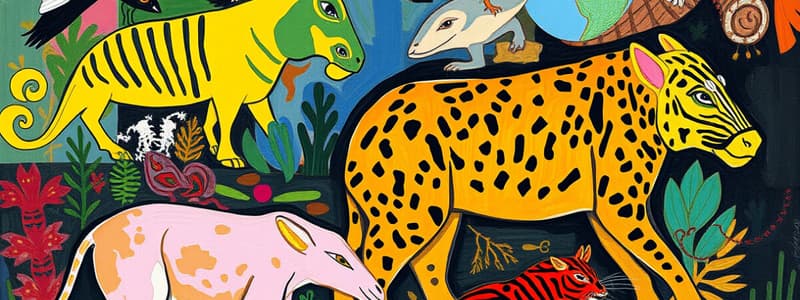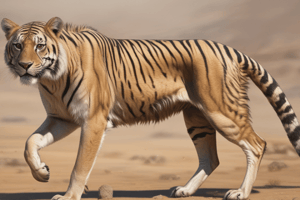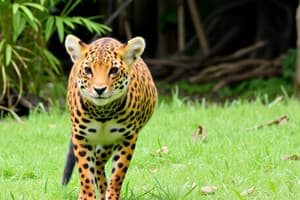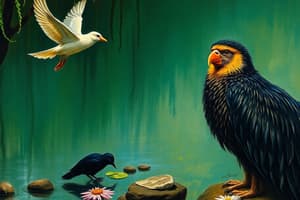Podcast
Questions and Answers
What is the collective term used to describe a group of whales?
What is the collective term used to describe a group of whales?
Pod
Which term refers to a group of flying birds?
Which term refers to a group of flying birds?
Flight
Name two mammals that fall under the category of endangered species.
Name two mammals that fall under the category of endangered species.
Amur Leopard, Sumatra Orangutan
Identify a reptile that is also an endangered species.
Identify a reptile that is also an endangered species.
What classification category includes both mammals and birds?
What classification category includes both mammals and birds?
What is the primary feature that distinguishes amphibians from reptiles in terms of their skin?
What is the primary feature that distinguishes amphibians from reptiles in terms of their skin?
Which specific group name is used for a colony of ants?
Which specific group name is used for a colony of ants?
What type of animals are defined as warm-blooded and typically lay eggs?
What type of animals are defined as warm-blooded and typically lay eggs?
Name a domesticated animal that belongs to the Ovidae family.
Name a domesticated animal that belongs to the Ovidae family.
What term describes the metamorphosis process seen in amphibians?
What term describes the metamorphosis process seen in amphibians?
Flashcards are hidden until you start studying
Study Notes
Common Animal Names
-
Mammals
- Dog
- Cat
- Elephant
- Tiger
- Whale
-
Birds
- Sparrow
- Eagle
- Penguin
- Parrot
- Ostrich
-
Reptiles
- Crocodile
- Snake
- Lizard
- Turtle
- Chameleon
-
Amphibians
- Frog
- Salamander
- Toad
- Newt
- Axolotl
-
Fish
- Salmon
- Goldfish
- Shark
- Tuna
- Catfish
-
Insects
- Butterfly
- Ant
- Bee
- Beetle
- Grasshopper
Group Names
- Mammals: Pod (whales), Pack (wolves), Pride (lions)
- Birds: Flock (birds), Flight (group of flying birds)
- Fish: School (fish), Shoal (group of fish)
- Insects: Swarm (bees), Colony (ants)
Notable Animal Species
-
Domestic Animals
- Cow
- Horse
- Sheep
- Pig
- Chicken
-
Wild Animals
- Giraffe
- Leopard
- Bear
- Rhino
- Zebra
Endangered Species
- Mammals: Amur Leopard, Sumatra Orangutan, Vaquita
- Birds: California Condor, Kakapo, Spix's Macaw
- Reptiles: Hawksbill Turtle, Komodo Dragon
- Amphibians: Axolotl, Golden Toad
Animal Classification
- Kingdom: Animalia
- Phylum: Chordata (vertebrates), Arthropoda (insects)
- Class: Mammalia, Aves (birds), Reptilia (reptiles)
- Order: Carnivora (carnivores), Herbivora (herbivores)
Characteristics
- Mammals: Warm-blooded, hair/fur, live birth (most), mammary glands
- Birds: Feathers, beaks, lay eggs, warm-blooded
- Reptiles: Cold-blooded, scales, lay eggs or live young
- Amphibians: Metamorphosis, moist skin, lay eggs in water
- Fish: Gills for breathing, fins for swimming, lay eggs in water
These notes provide a concise overview of animal names and classifications relevant to the study of animals.
Common Animal Names
- Mammals include domesticated and wild species like dogs, cats, elephants, and tigers.
- Birds consist of a diverse range, including sparrows, eagles, penguins, and parrots.
- Reptiles such as crocodiles, snakes, and chameleons display varied adaptations.
- Amphibians, including frogs and axolotls, undergo metamorphosis during their life cycle.
- Fish like salmon and sharks are aquatic and vary significantly in size and habitat.
- Insects include butterflies and bees, showcasing rapid reproduction and adaptation.
Group Names
- Mammals form groups such as pods for whales, packs for wolves, and prides for lions.
- Birds travel in flocks, while groups of flying birds are referred to as flights.
- Fish gather in schools or shoals for protection and feeding.
- Insects form swarms (bees) or colonies (ants) for social behavior and efficiency.
Notable Animal Species
- Domestic animals include cows, horses, and chickens, commonly found in agriculture.
- Wild animals such as giraffes and leopards inhabit diverse ecosystems and demonstrate natural behaviors.
Endangered Species
- Endangered mammals include the Amur leopard, Sumatra orangutan, and vaquita, facing threats from habitat loss and poaching.
- Bird species at risk include the California condor, kakapo, and Spix's macaw, often due to environmental changes.
- Notable reptiles like the hawksbill turtle and komodo dragon are also endangered.
- Among amphibians, the axolotl and golden toad are critically endangered due to habitat degradation.
Animal Classification
- All animals belong to the kingdom Animalia, with vertebrates classified under phylum Chordata.
- Insects fall under phylum Arthropoda, distinguished by their exoskeletons and segmented bodies.
- Classes include Mammalia for mammals, Aves for birds, and Reptilia for reptiles.
- Orders categorize species further, such as Carnivora for carnivores and Herbivora for herbivores.
Characteristics
- Mammals are warm-blooded, possess hair or fur, and most give live birth while producing milk.
- Birds are characterized by feathers and beaks, are warm-blooded, and reproduce by laying eggs.
- Reptiles are cold-blooded, covered in scales, and can lay eggs or give live birth.
- Amphibians, with moist skin, typically lay eggs in water and undergo metamorphosis from larvae to adults.
- Fish breathe through gills, live in aquatic environments, and most reproduce by laying eggs in water.
Studying That Suits You
Use AI to generate personalized quizzes and flashcards to suit your learning preferences.




